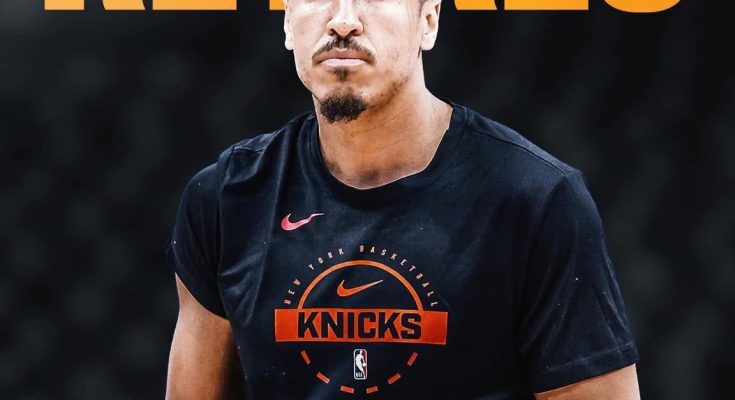Malcolm Brogdon’s sudden decision to retire after nine NBA seasons has sent ripples throughout the league, especially since it came right as the 2025–26 season was about to begin At age 32, he had agreed to a one‑year deal with the New York Knicks and looked poised to at least make the roster in a reserve role, before ultimately informing team officials that his playing days were over.
From his personal statement, Brogdon sounded resolute and deeply introspective: “Today, I officially begin my transition out of my basketball career,” he said. “I have proudly given my mind, body and spirit to the game over the last few decades. With the many sacrifices it took to get here, I have received many rewards. I am deeply grateful to have arrived to this point on my own terms and now to be able to reap the benefits of my career with my family and friends. Thank you, from the bottom of my heart, to all who have had a place in my journey.” (NBA)
That tone — of a man stepping away on his own terms — carries weight. Many athletes depart under duress, often having their bodies betray them or their roles evaporate. Brogdon’s decision appears more voluntary, more reflective. But that doesn’t mean it lacks hardship or uncertainty. It invites questions: Why retire now? What factors pushed him to this endpoint? What is his legacy? And what comes next?
From the outset, Brogdon’s journey ran counter to expectations. He was selected 36th overall in the 2016 NBA Draft by the Milwaukee Bucks, making him a second‑round pick. Yet he defied the odds by winning Rookie of the Year that same season — a rare feat and especially notable because few players picked outside the first round make that kind of immediate impact. (NBA) Over his career, he played for multiple teams: the Bucks, Indiana Pacers, Boston Celtics, Portland Trail Blazers, and Washington Wizards. (Reuters) In 2023, while with Boston, he earned Sixth Man of the Year honors — a testament to his ability to adapt, remain productive off the bench, and embrace the role of key contributor even when not a full-time starter. (NBA)
Statistically, his career was solid. Across his nine seasons, Brogdon averaged about 15.3 points, 4.7 assists and 4.1 rebounds per game, in roughly 29.1 minutes per contest. (NBA) His shooting — particularly from three — had ups and downs. From 2022 to 2024, his three‑point percentage hovered near 43 percent, which ranked among the better marks in the league. (ESPN) But in his final season, his outside efficiency dropped dramatically to a career-worst 29 percent, a sign that the game was becoming more physically taxing. (ESPN)
In recent years, injuries crept in and limited his availability. With Portland in 2023–24, he played in 39 games. (Reuters) In the 2024–25 season with Washington, he appeared in just 24 games — a career low. (ESPN) That drop in playing time and declining shooting may have factored into his assessment of whether another season was viable.
When he signed with the Knicks in September 2025, it was a relatively low-risk, one-year deal — non-guaranteed, likely to be for modest compensation compared to his earlier years. (Reuters) The Knicks saw him as a veteran depth piece, someone who could back up Jalen Brunson and bring experience to the guard rotation. (ESPN) But somewhere along the way between preseason and roster decisions, Brogdon evidently concluded that it was time to walk away — whether due to physical wear, diminishing returns, or a changing mindset.
In media reaction, many have lauded his integrity and class. The Knicks issued public congratulations on social media, acknowledging his contributions both on and off the court. (NBA) Sports commentators have speculated that his decision may have been partly motivated by a sense of self-preservation — avoiding a season where his performance would feel like a decline, or one in which he might struggle to stay healthy. The timing is notable: he retired just a week before the regular season was to begin.
What does his retirement mean for the Knicks? On one hand, they lose a seasoned, reliable guard who could have provided steady contributions off the bench. On the other hand, his departure forces them to re-examine their backcourt depth and rotation. Players like Landry Shamet, Garrison Mathews, or younger guards may now be pushed into more prominent roles. (New York Post)
Beyond the Knicks context, Brogdon’s exit underscores several broader truths about professional basketball. The margins between contribution and decline are razor-thin. Athletes must weigh diminishing physical returns against the demands of constant travel, training, and injury risk. Many who hang on too long lose the chance to leave with dignity; others depart prematurely and wonder if they still had something left. Brogdon seems to have chosen agency — walking away while he still felt some control.
In terms of legacy, Brogdon will not be celebrated as one of the all‑time greats, but he will be remembered as a high-character player with a compelling story. A second-round pick who became Rookie of the Year, a Sixth Man winner, a steady two-way guard, and someone who never shied from transition and adaptation. His ability to change roles and stay relevant in multiple systems speaks to his basketball IQ, professionalism, and work ethic.
As fans and commentators look back on his career, certain moments stand out: his immediate impact with Milwaukee, his mentorship role in Indiana, his production under pressure in Boston, and his perseverance in Portland and Washington despite injury setbacks. In college, as a star at Virginia, his jersey was retired in 2017 — a nod to the foundations of his character and work ethic even before the NBA stage.
Looking ahead, one imagines that Brogdon’s post‑basketball life will not lack direction. He’s often been praised for his leadership, his composure, and his cerebral approach to the game. He could pursue broadcasting, coaching, front office work, mentoring younger players, or perhaps endeavors outside basketball altogether — perhaps in business, philanthropy, or community engagement.
His departure is bittersweet. For Knicks fans, it’s a loss of anticipated depth. For league watchers, it’s a reminder of how fragile a basketball life can be. For Brogdon himself, it’s the end of a chapter, but perhaps the beginning of another — one in which he can reap the benefits of all he sacrificed for the game.
In the end, Malcolm Brogdon retires as a player who earned respect not by flash but by consistency, professionalism, and self‑knowledge. His voice in the locker room, his readiness to shift roles, and his willingness to bow out before becoming a shell of himself all speak to someone who viewed basketball not as an identity, but as a calling — one that he now feels ready to leave behind, on his own terms.


